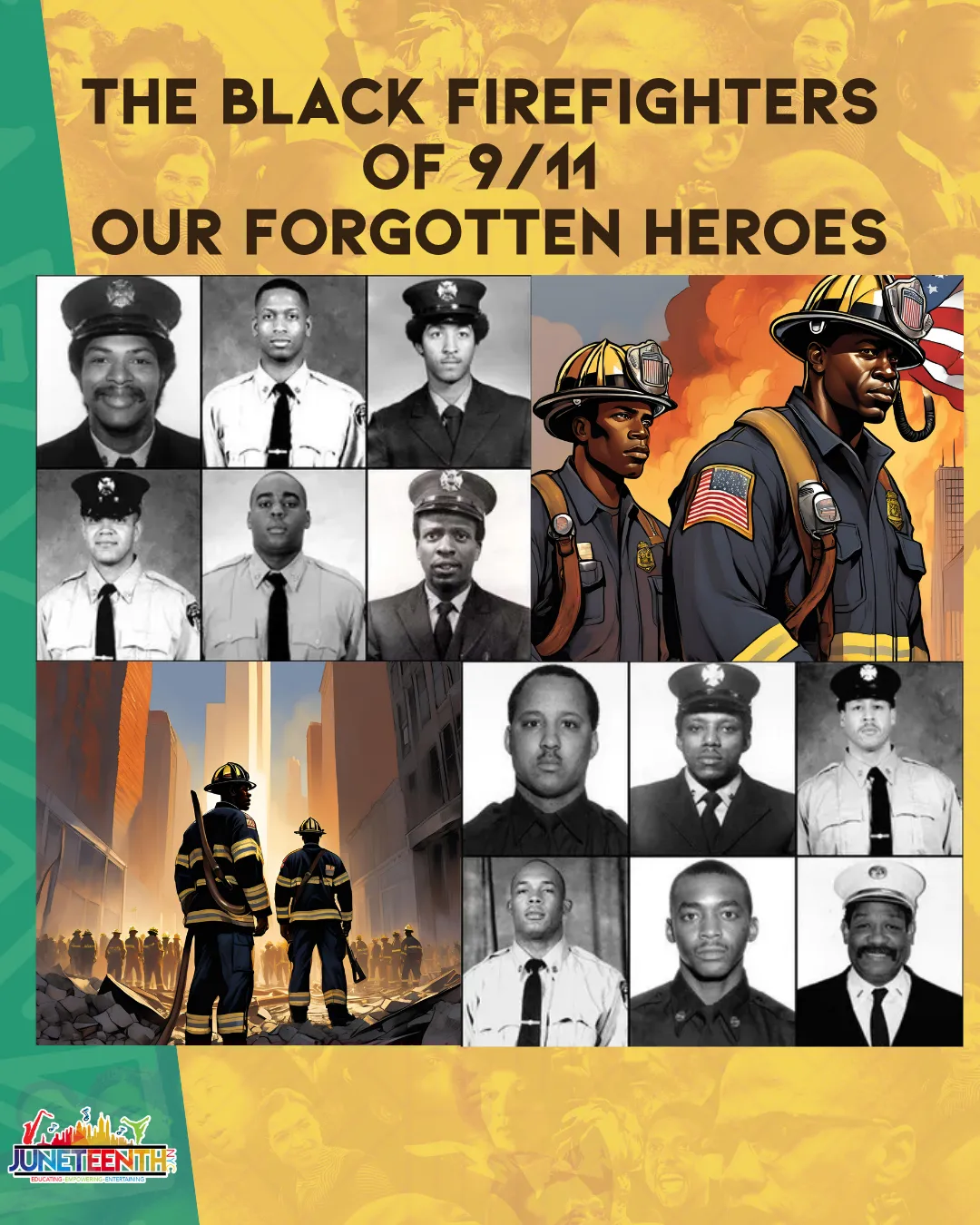
Juneteenth NY Blog

The Black Firefighters of 9/11 – Our Forgotten Heroes
The Black Firefighters of 9/11 – Our Forgotten Heroes

When we think about the heroes of 9/11, many images come to mind—firefighters rushing into danger, the haunting sight of the collapsing Twin Towers, and the faces of those lost. However, not all the heroes have been equally recognized. The Black firefighters who died in the line of duty on September 11, 2001, have often been overlooked in memorials, media, and historical accounts. These forgotten heroes made the ultimate sacrifice alongside their brothers and sisters, yet their stories are rarely told.
Honoring the Sacrifice
Among these unsung heroes is Leon W. Smith Jr., a dedicated firefighter whose dreams of serving his community were realized when he joined Ladder Company 118 in Brooklyn. Growing up in a Brooklyn neighborhood, Leon’s fascination with firefighting began early. His family home was right across from a fire station, and his passion for the profession blossomed from there. Despite facing personal and professional challenges, Leon’s determination never wavered.
Tragedy Strikes on 9/11
On that fateful day in September, Leon was one of the 343 firefighters who responded to the unimaginable chaos at the Twin Towers. His company, Ladder 118, lost eight members, including Leon. While the remains of most of his colleagues were found, Leon’s body was never recovered. His mother, Irene Smith, still clings to the hope that one day, his remains will be returned to her. Her grief, like the grief of so many mothers, remains a deep and unhealed wound.
The Black Firefighters of 9/11
Despite their sacrifices, the Black firefighters who lost their lives that day have been largely absent from public memorials. The mainstream media, early photo exhibits, and major tributes often focused on the predominantly White firefighters who perished, leaving little space for the stories of the 12 Black men who also gave their lives. The erasure of these heroes highlights the racial disparities that continue to persist, even in times of collective mourning.
Racism in the FDNY
The FDNY has a long and complicated history of racism, and many Black firefighters faced discrimination during their careers. Leon W. Smith Jr. was no exception. In the early days of his service, he encountered numerous acts of sabotage and harassment, from oil being poured into his boots to his equipment being tampered with. These attempts to break his spirit only fueled his passion for the job, though the emotional scars remained.
Efforts for Recognition
In the years since 9/11, various organizations, including the Vulcan Society, have fought tirelessly to ensure that the contributions of Black firefighters are recognized. The Vulcan Society, an organization representing Black firefighters in New York, held a memorial ceremony for the 12 Black men who died that day. Yet, even during this solemn event, racism reared its head. Flyers promoting the ceremony were defaced with derogatory comments, showing that the battle for equality was far from over.
Court Cases and Discrimination
Racial discrimination within the FDNY has been the subject of numerous court cases. A 2010 ruling found that the FDNY had engaged in discriminatory hiring practices, contributing to the low numbers of Black firefighters in the department. Despite these legal victories, the path to justice and true equality remains difficult.
The Strength of Black Mothers
Mothers like Irene Smith have shown incredible strength in the face of unimaginable loss. Determined to keep her son’s memory alive, Irene successfully lobbied for the co-naming of their street in Brooklyn, now known as Firefighter Leon W. Smith, Jr. Way. Other mothers, including Laurel Jackson and Ruth Powell, continue to honor their sons through scholarships and community initiatives. These women, united by grief, have formed an unbreakable bond that provides comfort and support in their darkest moments.
Brotherhood of Grief
Though divided by race, the families of fallen firefighters have found solace in each other. Black and White mothers alike meet regularly to share memories, provide updates, and offer support. Their shared sorrow has created a powerful and lasting bond, a testament to the enduring love they have for their sons.
The Vulcan Society
The Vulcan Society has been instrumental in advocating for greater diversity within the FDNY. Founded in 1940, this organization has worked tirelessly to improve the working conditions of Black firefighters and ensure that they receive equal opportunities. Their efforts have extended far beyond 9/11, pushing for systemic changes within the department and providing mentorship to young firefighters of color.
Documentary: "All Our Sons"
Craig Kelly, a retired firefighter and grief counselor, played a pivotal role in bringing the stories of Black firefighters to light. His documentary, All Our Sons, released in 2004, sheds light on the experiences of Black firefighters before, during, and after 9/11. Narrated by the talented Alfre Woodard, the film brings much-needed attention to the sacrifices made by these brave men.
Moving Forward
Though the FDNY has made strides in increasing diversity, much work remains to be done. Today, Black firefighters make up just 3% of the FDNY's workforce, a percentage that has remained stagnant since 9/11. The fight for equality within the department continues, driven by the efforts of organizations like the Vulcan Society and individuals like Irene Smith.
Conclusion
The Black firefighters of 9/11 were not only heroes but pioneers in their own right, battling not just the fires of that tragic day but the fires of racism and discrimination throughout their careers. Their stories deserve to be told, and their sacrifices must never be forgotten. As we continue to honor the heroes of 9/11, let us also remember those whose stories have remained in the shadows for far too long.
FAQs
Who were the Black firefighters of 9/11?
Twelve Black firefighters perished during the 9/11 attacks, including Leon W. Smith Jr., a driver for Ladder Company 118.What challenges did Black firefighters face within the FDNY?
Black firefighters like Leon faced harassment, sabotage, and systemic racism throughout their careers in the FDNY.How are the Black mothers of 9/11 supporting each other?
These mothers, united by grief, meet regularly to share memories and support each other through their collective loss.What role does the Vulcan Society play in the FDNY?
The Vulcan Society advocates for the rights and inclusion of Black firefighters, working to increase diversity within the FDNY.How can we support the families of Black 9/11 heroes?
Supporting organizations like the Vulcan Society and spreading awareness of the contributions of Black firefighters are crucial steps in honoring their legacy.


For other questions or comments about JuneteenthNY, please give us a call at 646-585-0456 or send us an email. We will get back to you within 24 hours.





Facebook
Instagram
X
LinkedIn
Youtube
TikTok